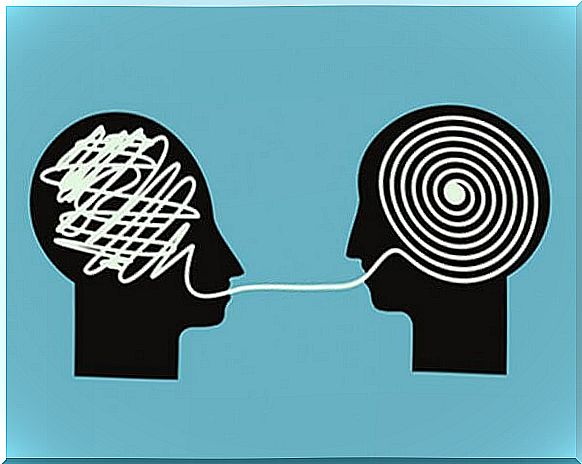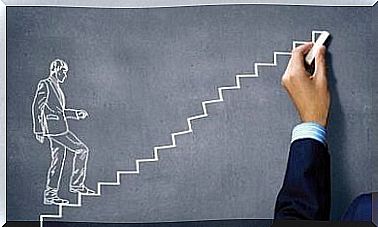7 Ways To Process Your Feelings

Learning techniques to process your emotions means that you calmly channel today’s stress. Although emotions are a part of life, we must not forget that being able to regulate them is important. In fact, it is the key to a better life with more opportunities.
Neuropsychologists say we have an average of 6,000 thoughts every day. Based on these, 95% are the same as you had the day before. The percentage is just a little lower for the thoughts from the week before.
Learning to think differently and changing our attitude towards certain people, ideas or situations is not easy. We know that. This is because no one enters this world with knowledge of what emotions and emotions are and how to control them.
We let the years go by while keeping our anger inside us because they told us we should not express it. They never told us how we should express it.
Because heroes do not get angry or scared. Therefore, there are not many role models for young children and not-so-small kids. Where do they see a good example of how to process their emotions?
James Gross, director of the Stanford Psychophysiology Laboratory, explains it in a better way. He says that you need knowledge about how to use different techniques to process your feelings. It is the key to preventing diseases such as depression or borderline personality disorder . Dealing with the clutter our thoughts and the negative emotions bring with them is synonymous with good health and well-being.

Techniques for processing your emotions
There are many different techniques for processing your emotions. But before we begin to research and risk being overwhelmed by all the approaches, dynamics, and suggestions the world gives us, we must be aware of one thing: processing our emotions is not the same for everyone. We have to do it with our own tools. Not all types of tools will work for everyone.
For example, it is common for many to begin with mindfulness, or mindfulness. They hope it will solve most of life’s puzzles. Not everyone learns to meditate. Not everyone finds physiological, mental peace in it.
The best thing to do is to use a multidimensional focus. This is when both the cognitive and the physiological, as well as behavior and emotions, point towards the same goal. The goal is better welfare, peace and better mental focus.
Now we are going to look at 7 different techniques for processing your emotions, and it has been proven that they are the most effective. We recommend that you try them all before proceeding with the one that works best for you.
Situations to avoid, situations to confront
Of course, we can not control everything that happens in our lives every day. But there are different situations that we can control. We can avoid them to improve our welfare.
- For example, leaving the house just when I have to means I’m in a hurry. It makes me come to work in a bad mood. So I should get up earlier so I do not get so busy.
- Sunday dinner with the family can give me anxiety and put me in a tense situation. In this case, it is best to suggest other options. That way, I can avoid that situation, considering my health.
- There are also obligations and situations I can not get out of. For example, I can not avoid lecturing at work or avoid flying. All it will do is increase the anxiety inside me. Sometimes we have to face our fears to get over it.

2. Focus your attention on something else
My colleague gets more contracts than me. My neighbor managed to lose weight before me. The train is going too fast, we’ll crash. It’s just bad news in the newspaper, something wrong is definitely going to happen…
All these thoughts do is stress us out. They make us feel afraid, they make us lose our self-esteem, and they can make us lose control of our lives. We must learn to shift our gaze from our immediate surroundings and their complexity. That way we can direct it inwards.
When we first look inward, take care of ourselves and listen to what the body tells us, everything will balance itself again. This is one of the best ways to process your emotions.
3. Improve your self-control by focusing on your near future
We know that the concept of focusing on the here and now is very popular right now. Well, we’ll suggest something a little different. Think about your near future. Think about tomorrow or next week.
- Sometimes the present is filled with fear, stress and frustration.
- Instead, think of these as actions that you must take on a regular basis. “I want to feel good, I want to manage this, I want this to happen and I want to feel more confident in myself.”
If you focus on simple, positive, promising goals for your immediate future, you will find more motivation in the present.
- Use confirmations. Remember your strengths and successes so that you can put all your hope into your immediate future.
4. Mental Note: Save your worries for a specific part of the day
Nietzsche once said: thoughts come when they want, not when we want. It’s the same with worries. They are like birds that sit on the power lines of fear and anxiety. They are there to make it worse, to turn off our optimism and leave us in the dark.
Do not let them do that. Whenever a concern appears in the “inbox”, turn it off. Save it for later and choose a time during the day when you are calm and relaxed. At that time, you can reflect on and find solutions to your problems.

5. Questions and Answers: What is the worst thing that can happen?
It happens to everyone. Sometimes we get obsessed with things and hit our heads against the wall because we can not find a way out. There are thoughts like “they are going to fire me”, “my boyfriend is not giving me as much attention anymore”, “I am not going to be able to pay back the debt…” They make us tired of walking around ring.
Instead of feeding these thoughts, it is important to teach us to take the extra step. Let us ask ourselves what can happen if what we fear most actually happens. But at the same time we must find a solution:
- “If I get fired, I can finally pursue the dream of starting the project I want.”
- “If my boyfriend does not pay attention to me, I can ask him what is wrong. If our relationship does not work, I will accept it, work through the pain and get over it. ”
- “If I can not pay my debts, I have to sell something or ask my family for help.”
6. Meditation is a way to relax
Meditation is one of the most effective techniques for processing your emotions. But for this strategy to work, you need to practice a lot. We will not see results the first week, and maybe not even the first month.
If we practice regularly we will definitely see a result. The key to seeing it is to be patient and to be consistent.
7. Find your way out, your way of expressing yourself
There are people who find refuge and their way of expressing themselves through writing. Maybe you draw, or color mandalas as a technique to process your feelings. Some people like to run, some need silence and nature. But then there are those who feel better by drinking coffee with friends, reading books, listening to music, walking the dog or finding time alone.
The best techniques for working through your emotions do not always come from a book. Sometimes we have to find them ourselves. Most often we find it when we mint expect it.
It is a place where we get to know ourselves again to find the cause of all our problems. They are a refuge of peace and satisfaction where our bravery finds a home.

So let’s find a way to express ourselves and to feel better. Let’s give ourselves some time and apply some of the methods here. For our health. No matter what measures we take, it will be worth it.
Source list:
Gross, JJ (2001). Emotion regulation in adulthood: Timing is everything. Current Directions in Psychological Science, 10, 214-219. DOI: 10.1111 / 1467-8721.00152.
Gross, JJ, & Jazaieri, H. (2014). Emotion, emotion regulation, and psychopathology: An affective science perspective. Clinical Psychological Science.
Goleman, Daniel (1995). Emotional Intelligence. Bantam Books.
Bradberry, Travis. Greaves, Jean (2009). Emotional Intelligence 2.0. Talent Smart.
R.Covey Stephen (1988). The 7 Habits of Highly Effective People. Free Press.









